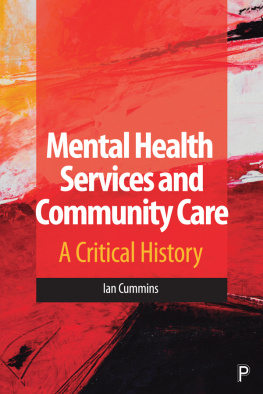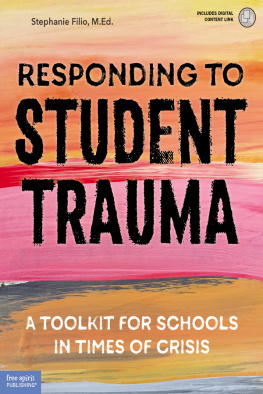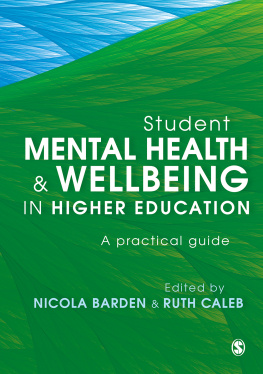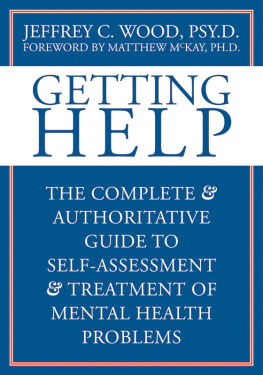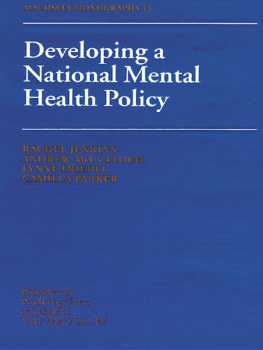MENTAL
HEALTH
in
Schools
Engaging Learners,
Preventing Problems,
and Improving Schools
HOWARD S. ADELMAN LINDA TAYLOR

Copyright 2010 by Corwin
All rights reserved. When forms and sample documents are included, their use is authorized only by educators, local school sites, and/or noncommercial or nonprofit entities that have purchased the book. Except for that usage, no part of this book may be reproduced or utilized in any form or by any means, electronic or mechanical, including photocopying, recording, or by any information storage and retrieval system, without permission in writing from the publisher.
For information:
 | Corwin
A SAGE Company
2455 Teller Road
Thousand Oaks, California 91320
(800) 233-9936
Fax: (800) 417-2466
www.corwinpress.com | SAGE India Pvt. Ltd.
B 1/I 1 Mohan Cooperative Industrial Area
Mathura Road, New Delhi 110 044
India |
SAGE Ltd.
1 Olivers Yard
55 City Road
London EC1Y 1SP
United Kingdom | SAGE Asia-Pacific Pte. Ltd.
33 Pekin Street #02-01
Far East Square
Singapore 048763 |
Printed in the United States of America
Library of Congress Cataloging-in-Publication Data
Adelman, Howard S.
Mental health in schools: engaging learners, preventing problems, and improving schools/Howard S. Adelman and Linda Taylor.
p. cm.
Includes bibliographical references and index.
ISBN 978-1-4129-7538-4 (pbk.)
1. StudentsMental healthUnited States. 2. StudentsMental health servicesUnited States. 3. School improvement programsUnited States. I. Taylor, Linda (Linda L.) II. Title.
LB3430.A34 2010
371.713dc22 2009019961
This book is printed on acid-free paper.
09 10 11 12 13 10 9 8 7 6 5 4 3 2 1
| Acquisitions Editor: | Jessica Allan |
| Editorial Assistant: | Joanna Coelho |
| Production Editor: | Cassandra Margaret Seibel |
| Copy Editor: | Jeannette McCoy |
| Typesetter: | C&M Digitals (P) Ltd. |
| Proofreader: | Taryn Bigelow |
| Indexer: | Jean Casalegno |
| Cover Designer: | Michael Dubowe |
Contents
Preface
T his book is about improving schools, preventing problems, and engaging students by moving in new directions for mental health in schools. This ambitious agenda requires the attention of all who have a stake in public education. Therefore, our intended audience is quite broad (e.g., leaders, administrators, student support staff, teachers, other practitioners, researchers, those involved in personnel preparation, and policy makers).
Many matters arise when the topic of mental health in schools is discussed. Prominent are questions such as the following:
Why should schools be involved with mental health?
Should the focus of mental health in schools be on
- mental illness? mental health? both?
- special education students or all students? or
- services or programs or a comprehensive system of supports?
What is the context for the work, and who should be responsible for its planning, implementation, and evaluation?
We explore all this and much more with a view to moving in new directions.
Over the years, we have pursued the advancement of mental health in schools by focusing on fully integrating the matter into school improvement policy, planning, and practice. Since 1986, our work has been carried out under the auspices of the School Mental Health Project at UCLA, and since 1995, our efforts have been embedded in the Projects national Center for Mental Health in Schools.
One facet of the Centers work is designed to facilitate discussion of issues, write and share policy and practice analyses and recommendations, and develop prototypes for new directions. Another facet provides guides to and resources for practice.
The following is a book-length compilation that pulls together our work over many years. It complements our two books published by Corwin in 2006: (1) The School Leaders Guide to Student Learning Supports: New Directions for Addressing Barriers to Learning and (2) The Implementation Guide to Student Learning Supports in the Classroom and Schoolwide: New Directions for Addressing Barriers to Learning. Readers who want to drill deeper into the many topics covered in this book can turn to these and to the growing body of resources available at no cost on the UCLA Centers Web site (http://smhp.psych.ucla.edu).
Because of the urgency for creating a school environment that promotes mental health and reduces problems, our primary aim here is to stimulate major systemic transformation. To this end, we stress new directions and resources for systemic change. At the same time, we highlight resources to aid those who currently are striving each day to make lives better for students and school staff.
We begin with a brief reflection on what schools have been and are doing about mental health concerns. Then, we explore major concerns, emerging trends, new directions, policy and systemic change implications, and end with a call to action. While we identify system deficiencies, we have nothing but the highest respect for those professionals who strive each day to ensure that all students have an equal opportunity to succeed at school.
As always, we owe many folks for the contents of this book. We thank everyone for their contribution, and as always, we take full responsibility for any misinterpretations and errors.
Howard Adelman and Linda Taylor
DEDICATION
To those trailblazers who are moving the field forward.
Acknowledgments
N o one will doubt that our work owes much to many. We have benefited from the insights, challenges, and wisdom of so many colleagues and the shared treasure of the accumulated research and writing of scholars over the years.
We are especially indebted to those pioneers who are trailblazing new directions forward.
And we are oh so grateful to Perry Nelson and the host of graduate and undergraduate students at UCLA who contribute so much to our work each day, and we thank the many young people and their families who continue to teach us all.
We also want to acknowledge that partial support for the Center for Mental Health in Schools comes from the Office of Adolescent Health, Maternal and Child Health Bureau (Title V, Social Security Act), Health Resources and Services Administration (Project #U45 MC 00175), U.S. Department of Health and Human Services.
PUBLISHERS ACKNOWLEDGMENTS
Corwin gratefully acknowledges the following peer reviewers for their editorial insight and guidance:
Pamela Frazier-Anderson, PhD
Program Evaluator (Education
Programs)
Trained and Nationally Certified School
Psychologist and Consultant
Norwalk, CT
Lyman Goding
Lecturer, Bridgewater State College
Retired Principal, Plymouth (MA)
Community Intermediate School
Bridgewater, MA
Diana Joyce, PhD, NCSP
Psychologist
University of Florida
Gainesville, FL
Marian White-Hood
Director of Academics, Accountability,
and Principal Support
See Forever Foundation
Washington, DC
About the Authors

Next page

